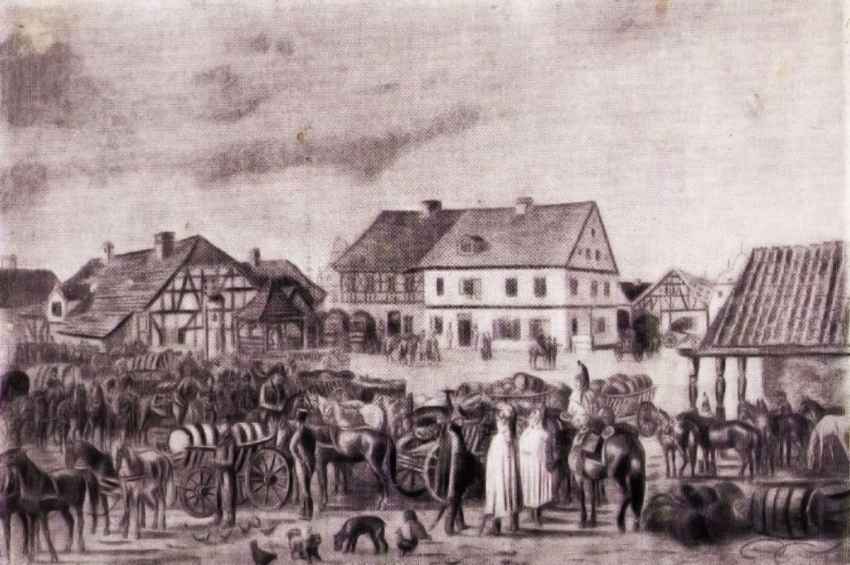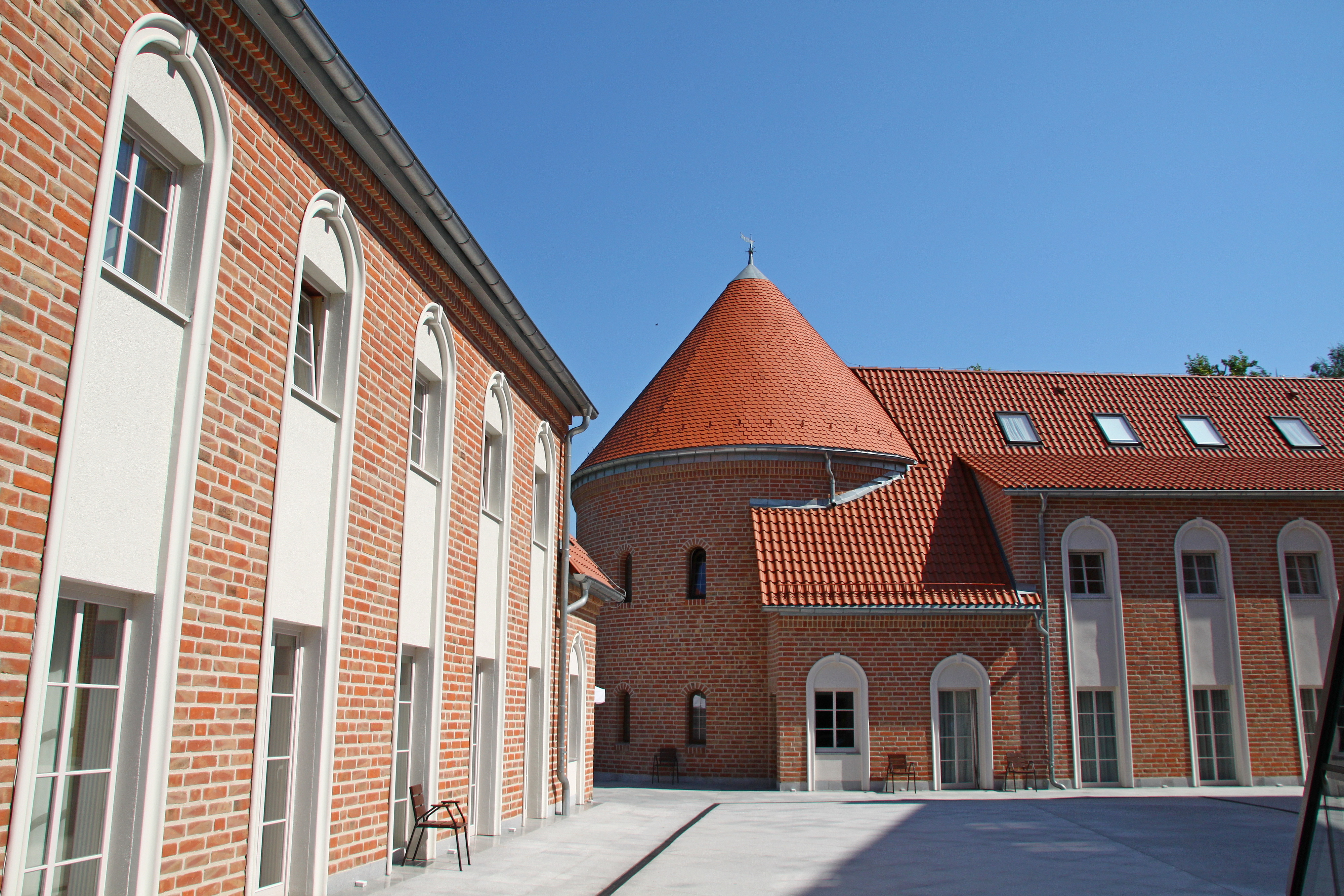|
Allenstein (region)
Regierungsbezirk Allenstein was a ''Regierungsbezirk'', or government region, of the Prussian province of East Prussia from 1905 until 1945. The regional capital was Allenstein (present-day Olsztyn). The territory today is part of the Polish Warmian-Masurian Voivodeship. History The government region was created on 1 November 1905 as the third East Prussian ''Regierungsbezirk'' out of the southern districts of the two original administrative regions Gumbinnen and Königsberg, which had been established in 1815. It comprised the south of the former Duchy of Prussia; the lands of the Allenstein and Rößel districts had belonged to the Prince-Bishopric of Warmia, annexed by Prussia in 1772. In 1920 1920 East Prussian plebiscite all the Allenstein Region plus the was part of the Allenstein Plebiscite precinct, with the electorate voting for remaining with Germany by more than 97%. In 1945 following World War II, Regierungsbezirk Allenstein was dissolved when East Prussia was partit ... [...More Info...] [...Related Items...] OR: [Wikipedia] [Google] [Baidu] |
Prusy Wschodnie De
Prusy may refer to: * Prusy, Aube, France * Prusy, Bánovce nad Bebravou, Slovakia *Prusy, Greater Poland Voivodeship (west-central Poland) *Prusy, Lesser Poland Voivodeship (south Poland) *Prusy, Łódź Voivodeship (central Poland) *Prusy, Lower Silesian Voivodeship (south-west Poland) *Prusy, Grójec County in Masovian Voivodeship (east-central Poland) *Prusy, Łosice County in Masovian Voivodeship (east-central Poland) *Prusy, Mińsk County in Masovian Voivodeship (east-central Poland) *Prusy, Warsaw West County in Masovian Voivodeship (east-central Poland) *Prusy, Busko County in Świętokrzyskie Voivodeship (south-central Poland) *Prusy, Opatów County in Świętokrzyskie Voivodeship (south-central Poland) *Prusy, Warmian-Masurian Voivodeship (north Poland) * ''Prusy'', the Polish name for Prussia {{geodis ... [...More Info...] [...Related Items...] OR: [Wikipedia] [Google] [Baidu] |
German Language
German ( ) is a West Germanic languages, West Germanic language mainly spoken in Central Europe. It is the most widely spoken and Official language, official or co-official language in Germany, Austria, Switzerland, Liechtenstein, and the Italy, Italian province of South Tyrol. It is also a co-official language of Luxembourg and German-speaking Community of Belgium, Belgium, as well as a national language in Namibia. Outside Germany, it is also spoken by German communities in France (Bas-Rhin), Czech Republic (North Bohemia), Poland (Upper Silesia), Slovakia (Bratislava Region), and Hungary (Sopron). German is most similar to other languages within the West Germanic language branch, including Afrikaans, Dutch language, Dutch, English language, English, the Frisian languages, Low German, Luxembourgish, Scots language, Scots, and Yiddish. It also contains close similarities in vocabulary to some languages in the North Germanic languages, North Germanic group, such as Danish lan ... [...More Info...] [...Related Items...] OR: [Wikipedia] [Google] [Baidu] |
States And Territories Disestablished In 1945
State may refer to: Arts, entertainment, and media Literature * ''State Magazine'', a monthly magazine published by the U.S. Department of State * ''The State'' (newspaper), a daily newspaper in Columbia, South Carolina, United States * ''Our State'', a monthly magazine published in North Carolina and formerly called ''The State'' * The State (Larry Niven), a fictional future government in three novels by Larry Niven Music Groups and labels * States Records, an American record label * The State (band), Australian band previously known as the Cutters Albums * ''State'' (album), a 2013 album by Todd Rundgren * ''States'' (album), a 2013 album by the Paper Kites * ''States'', a 1991 album by Klinik * ''The State'' (album), a 1999 album by Nickelback Television * ''The State'' (American TV series), 1993 * ''The State'' (British TV series), 2017 Other * The State (comedy troupe), an American comedy troupe Law and politics * State (polity), a centralized political organization ... [...More Info...] [...Related Items...] OR: [Wikipedia] [Google] [Baidu] |
1905 Establishments In Germany
Nineteen or 19 may refer to: * 19 (number), the natural number following 18 and preceding 20 * one of the years 19 BC, AD 19, 1919, 2019 Films * ''19'' (film), a 2001 Japanese film * ''Nineteen'' (film), a 1987 science fiction film Music * 19 (band), a Japanese pop music duo Albums * ''19'' (Adele album), 2008 * ''19'', a 2003 album by Alsou * ''19'', a 2006 album by Evan Yo * ''19'', a 2018 album by MHD * ''19'', one half of the double album ''63/19'' by Kool A.D. * ''Number Nineteen'', a 1971 album by American jazz pianist Mal Waldron * ''XIX'' (EP), a 2019 EP by 1the9 Songs * "19" (song), a 1985 song by British musician Paul Hardcastle. * "Nineteen", a song by Bad4Good from the 1992 album '' Refugee'' * "Nineteen", a song by Karma to Burn from the 2001 album ''Almost Heathen''. * "Nineteen" (song), a 2007 song by American singer Billy Ray Cyrus. * "Nineteen", a song by Tegan and Sara from the 2007 album '' The Con''. * "XIX" (song), a 2014 song by Slipknot. ... [...More Info...] [...Related Items...] OR: [Wikipedia] [Google] [Baidu] |
Biskupiec
Biskupiec (german: Bischofsburg, ) is a town in northern Poland, in Warmia, in the Warmian-Masurian Voivodeship. It is located in Olsztyn County and, as of December 2021, it has a population of 10,496. The countryside surrounding Biskupiec is a popular tourist destination, part of the Masurian Lake District. History The town's name derived from the Prince-Bishops of Warmia, who had a castle built in the southeastern outskirts of their realm on the ''Dymer'' creek in the late 14th century. The fortress was first mentioned in a 1389 deed, the settlement that had developed nearby received town privileges according to Kulm law by Bishop Henry III Sorbom in 1395. The town sided with the Prussian Confederation, at the request of which King Casimir IV Jagiellon signed the act of incorporation of the region to Poland in 1454. The town and castle were devastated during the subsequent Thirteen Years' War (1454–66) between the rebellious Prussian Confederation and the State of the Teu ... [...More Info...] [...Related Items...] OR: [Wikipedia] [Google] [Baidu] |
Mrągowo
Mrągowo (until 1947 pl, Ządźbork ; ) is a resort town in the Warmian-Masurian Voivodeship of northeastern Poland, with 21,889 inhabitants (2019). It is the capital of Mrągowo County and the seat (though not part of) the Gmina Mrągowo. The town is located in the historical region of Masuria, within the Masurian Lake District, about east of Olsztyn. History Middle Ages About 1348 the Teutonic Knights constructed a wooden fortress near present-day Mrągowo named ''Sensburg'', derived from Old Prussian ''senas'' meaning "old", therefore maybe at the site of a former Prussian castle. The settlement that began to develop nearby was first mentioned in a 1397 deed and probably had already received Kulm town rights between 1404 and 1407, although it is verified that Grand Master Konrad von Erlichshausen affirmed town rights in 1444. As a result of the Thirteen Years’ War (1454–1466) the settlement came under Polish suzerainty as a fief. Modern era Sensburg became part of ... [...More Info...] [...Related Items...] OR: [Wikipedia] [Google] [Baidu] |
Ostróda
Ostróda (; Old Prussian: ''Austrāti'') is a town in northern Poland, in the historic region of Masuria. It is the seat of the Ostróda County within the Warmian-Masurian Voivodeship and has approximately 33,191 inhabitants (2009). Ostróda is the largest town in the western part of Masuria, and the second largest in all of Masuria after Ełk. Geography The town lies in the west of the historic Masuria region on the Drwęca river, a right tributary of the Vistula. Lake Drwęca west of the town is part of the Masurian Lake District. Ostróda has become a growing tourist site owing to its relaxing natural surroundings. The National road 7 from Gdańsk to Warsaw, part of European route E77, passes through Ostróda. The Elbląg Canal connects Ostróda with the Baltic coast. History Middle Ages At the site of an original settlement of Old Prussians on an island at the river delta where the Drwęca river flows into Lake Drwęca the town of Ostróda evolved. In 1270 the Teutonic ... [...More Info...] [...Related Items...] OR: [Wikipedia] [Google] [Baidu] |
Szczytno
Szczytno (german: Ortelsburg) is a town in northeastern Poland with 27,970 inhabitants (2004). Szczytno is situated in the Warmian-Masurian Voivodship (since 1999), but was previously in Olsztyn Voivodship (1975-1998). It is located within the historic region of Masuria. Olsztyn-Mazury Regional Airport, located nearby, is the most important airport of the Masurian region. Szczytno, which is located on the Olsztyn – Ełk line, and used to be a railroad junction until Polish Railways closed minor connections stemming from the town towards Czerwonka and Wielbark. Two lakes, Domowe Małe and Długie (also known as ''Domowe Duże''), are located within the town limits. History Middle Ages Near today's Szczytno are the only known megalithic tombs in Warmia-Masuria. The town was originally a settlement of Old Prussians. Between 1350 and 1360 Ortolf von Trier, a knight of the Teutonic Order and the Komtur of Elbing (Elbląg), founded a fort in the Old Prussian region of Galindi ... [...More Info...] [...Related Items...] OR: [Wikipedia] [Google] [Baidu] |
Nidzica
Nidzica (former pl, Nibork; ) (Old Prussian: Nīdaspils) is a town in the Warmian-Masurian Voivodeship of Poland, lying between Olsztyn and Mława, in Masuria. The capital of Nidzica County, it had a population in 2017 of 13,872. History The settlement was originally founded by Old Prussians who established a small fortified fortNidzica: z dziejów miasta i okolic Władysław Korzeniowski - Wydawnictwo Pojezierze 1976 page 62 and were subsequently invaded by Teutonic Knights in 1355, who then erected a small castle around 1376 and implemented German Town Law in the settlement after 1381. After the victorious Battle of Grunwald (1410) the town remained in Polish hands for three months.''Słownik geograficzny Królestwa Polskiego i innych krajów słowiańskich'', Tom VII, Warsaw, 1886, p. 31 (in Polish) It was again captured by the Poles in 1414. From 1444 Neidenburg was a member of the Prussian Confederation, at which request in 1454 Polish King Casimir IV Jagiellon signed ... [...More Info...] [...Related Items...] OR: [Wikipedia] [Google] [Baidu] |
Ełk
Ełk (; former pl, Łek; german: Lyck; Old Prussian: ''Luks''; lt, Lukas), also spelled Elk in English, is a small city in northeastern Poland with 61,677 inhabitants as of December 2021. It was assigned to Warmian-Masurian Voivodeship in 1999, after belonging to Suwałki Voivodeship from 1975 to 1998. Ełk is the seat of Ełk County. It lies on the shore of Ełk Lake, which was formed by a glacier, and is surrounded by extensive forests. It is the largest city and unofficial capital of historical Masuria. One of the principal attractions in the area is legal hunting. History Middle Ages The area where the town of Ełk is located was originally inhabited by Jatvingians, a Baltic peoples, during the early middle ages. By 1281, Skomand (Lithuanian: ''Skalmantas'') the last leader of the pagan Jatvingians, capitulated to the crusading Teutonic Knights, who initially were invited in 1226 by Konrad I of Masovia from the Polish Piast dynasty to put an end to the constant pagan rai ... [...More Info...] [...Related Items...] OR: [Wikipedia] [Google] [Baidu] |
Giżycko
Giżycko (former pl, Lec or ''Łuczany''; ; lt, Leičių pilis) is a town in northeastern Poland with 28,597 inhabitants as of December 2021. It is situated between Lake Kisajno and Lake Niegocin in the region of Masuria, and has been within the Warmian-Masurian Voivodeship since 1999, having previously been in the Suwałki Voivodeship (1975–1998). It is the seat of Giżycko County. Giżycko is a popular summer tourist destination due to its location within the Masurian Lake District and possesses numerous historical monuments, including a 14th-century Teutonic castle. History Antiquity and Middle Ages The first known settlements in the area of today's Giżycko were recorded in Roman times by Tacitus in his Germania and are connected to Amber Road in vicinity of which Giżycko was located. A defensive settlement of the Baltic Prussians was known to exist in the area, and in IX was recorded as being ruled by king known as Izegup or Jesegup. After his failed attempt in 99 ... [...More Info...] [...Related Items...] OR: [Wikipedia] [Google] [Baidu] |


.jpg)
